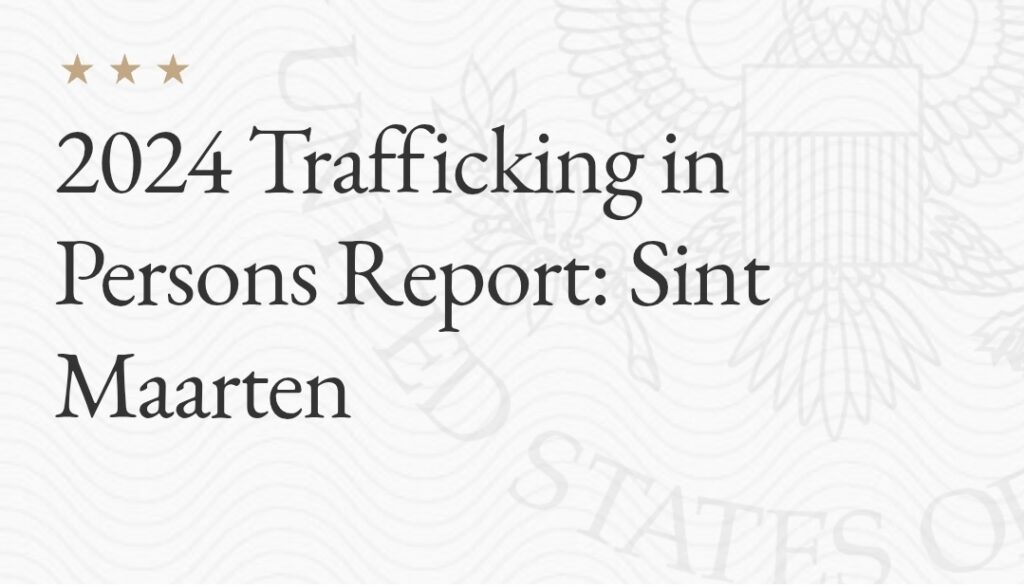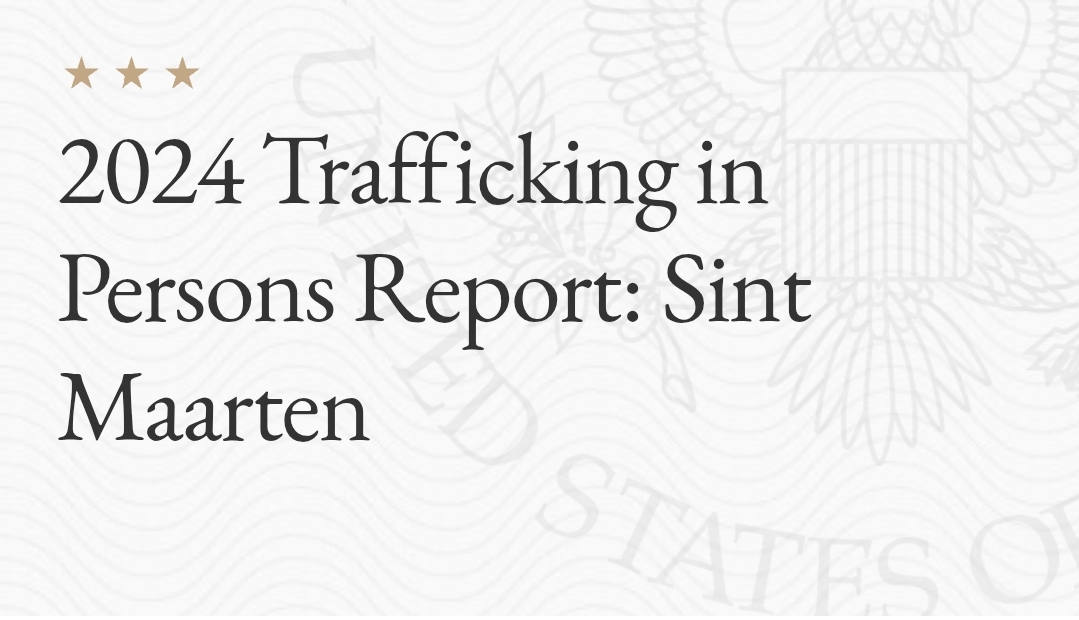2024 Trafficking in Persons Report: Sint Maarten

2024 Trafficking in Persons Report: Sint Maarten/
SINT MAARTEN (Tier 3)*SINT MAARTEN (Tier 3)*The Government of Sint Maarten does not fully meet the minimum standards for the elimination of trafficking and is not making significant efforts to do so;
therefore Sint Maarten remained on Tier 3. Despite the lack of significant efforts,
the government took some steps to address trafficking,
including reinstating its defunct lead agency for coordinating anti-trafficking efforts and training officials,
in partnership with foreign governments, on trafficking indicators.
However, the government did not report prosecuting or convicting any traffickers or identifying any trafficking victims for the fourth consecutive year.
Further, the government could not provide services to trafficking victims;
it did not have shelters, allocate funding for victim services,
or have formal arrangements with service providers.
The government did not formally adopt its draft NAP and interagency coordination was severely lacking.
Officials consistently conflated human trafficking and migrant smuggling, hindering the effectiveness of the government’s meager anti-trafficking efforts.
PRIORITIZED RECOMMENDATIONS:
Significantly increase efforts to investigate, prosecute, and, as appropriate, convict human traffickers.
* Proactively identify trafficking victims,
such as by screening migrant workers for trafficking indicators;
provide adequate protection to identified trafficking victims; and ensure victims are not inappropriately penalized, including through deportation,
solely for unlawful acts committed as a direct result of being trafficked.
* Adopt and vigorously implement the draft NAP. * Improve coordination and information-sharing with anti-trafficking counterparts across the Kingdom of the Netherlands.
* Increase the availability of protection services, including shelters, in partnership with NGOs, the Kingdom of the Netherlands, and international organizations.
* Train law enforcement officials, prosecutors, and judges on proactive victim identification, victim-centered approaches to trafficking cases, and the distinction between human trafficking and migrant smuggling.
* Fund and fully operationalize the reinstated National Reporting Center on Human Trafficking (NRC) to improve coordination of victim protection and prevention efforts.
* Adopt and implement formal SOPs to guide officials, including health workers, on victim identification and referral.
* Inform victims and potential victims of their rights. * Increase awareness of human trafficking,
available services, and how to seek assistance among the general public and vulnerable groups,
including incoming migrants.
PROSECUTION
The government maintained minimal prosecution efforts. Article 2:239 of the penal code criminalized sex trafficking and labor trafficking and prescribed penalties of up to nine years’ imprisonment or a fine for offenses involving a victim 16 years of age or older, and up to 12 years in prison or a fine for those involving a victim younger than the age of 16. These penalties were sufficiently stringent and, with respect to sex trafficking, commensurate with penalties prescribed for other serious crimes, such as kidnapping.The government reported initiating one trafficking-related investigation in 2023, compared with one investigation in 2022. The government did not report any new prosecutions or convictions related to trafficking in 2023 or 2022. Conflation of human trafficking and migrant smuggling obstructed attempts to investigate, prosecute, or convict traffickers; promoted harmful misconceptions about trafficking; and limited law enforcement officials’ capacity to recognize trafficking indicators and identify trafficking victims.The Sint Maarten police force maintained a combined anti-human trafficking and anti-migrant smuggling unit (UMM), consisting of five officers, which worked closely with the public prosecutor’s office to investigate potential trafficking crimes. A designated prosecutor oversaw developing human trafficking and migrant smuggling cases. UMM operated without a dedicated budget and with limited staffing; the government reported Royal Netherlands Marechaussee (KMAR) embedded officers within UMM to mitigate staffing limitations. Observers reported the unit’s resources varied based on the relative prioritization of anti-trafficking or anti-smuggling operations within the government.
The government did not report any substantive collaboration with foreign governments on trafficking cases. UMM often worked with KMAR, the joint Dutch Caribbean Coast Guard, and other Kingdom entities; observers reported interagency communication was inefficient. The government did not report any investigations, prosecutions, or convictions of government employees complicit in human trafficking crimes.

The government trained law enforcement and other officials on trafficking indicators in partnership with the Government of Aruba and other governments.
The Kingdom continued to fund a recurring anti-trafficking training opportunity for border protection officials.PROTECTIONThe government maintained inadequate protection efforts. Authorities did not identify any trafficking victims for the fourth consecutive year.
For the sixth consecutive year, the government did not report providing any protection services to victims, including to victims identified in earlier years.
The government did not have SOPs for the identification or referral of victims, and, instead, relied on informal coordination between government agencies.
The Ministry of Justice reportedly began drafting a “screening toolkit” outlining identification and referral protocols; it did not complete the draft toolkit before the end of the reporting period.
The government reported it distributed pamphlets featuring an NGO-developed checklist on trafficking indicators to immigration officials and other government stakeholders who might encounter potential victims.
However, the government did not report efforts to use the checklist to proactively screen vulnerable populations, such as individuals in commercial sex and undocumented migrants, as it had in past years.
In January 2023 the government reinstated the NRC, previously called the National Reporting Bureau, as the lead agency responsible for victim protection. The government’s victim support agency, which aided victims of all crimes, could also support trafficking victims.
However, the government did not allocate funding to provide services for trafficking victims and did not have agreements with civil society organizations to provide care services, such as shelter, in the absence of government funding.
Government officials could only arrange short-term shelter for victims in “dire” circumstances. The government did not report any victims receiving shelter in 2023. There were no dedicated shelters for trafficking victims.
An NGO-run shelter for victims of domestic violence could sometimes accommodate female trafficking victims. The government did not provide financial support to shelters equipped to support trafficking victims and reported few such organizations existed in Sint Maarten. The government did not report any foreign victims applying for temporary residency status; this status was only valid for the duration of criminal proceedings against the trafficker, and it would not grant victims the right to work. The government last reported granting a residence permit to a trafficking victim in December 2015. The government considered residency status to be a temporary measure to facilitate victim cooperation in trials against traffickers, rather than a means of ensuring victims have legal alternatives to removal to countries where they would face retribution or hardship. Due to a lack of formal identification procedures and widespread conflation of human trafficking and migrant smuggling, authorities likely deported and otherwise penalized unidentified trafficking victims for unlawful acts traffickers compelled them to commit. The anti-trafficking law allowed victims to request restitution as part of criminal cases or file a civil suit against traffickers to obtain compensation; however, no victims received restitution or filed civil suits in 2023.
PREVENTION
The government maintained its efforts to prevent trafficking, which remained insufficient. The national anti-trafficking coordinator and national prosecutor’s office jointly led efforts to combat human trafficking and coordinated routinely; the national coordinator operated without a budget or staff in this capacity and had other full-time duties. The government’s reinstated NRC lacked funding and official status during the reporting period, though it operated under the border protection agency and comprised two staff members. https://stmaartennews.ai/dutch-minister-of-defense-ruben-brekelmans-visiting-point-blanche-st-maarten/
The government continued to revise the draft 2022-2023 NAP, which outlined objectives to improve the government’s anti-trafficking framework, including by creating new SOPs for victim identification and referral, cultivating civil society partnerships to facilitate service provision, and creating a national anti-trafficking hotline. However, the government did not report formally adopting or implementing the plan in 2023.
The national coordinator collaborated virtually and in-person with national anti-trafficking coordinators from Aruba, Curaçao, and the Netherlands to revise the MOU outlining coordinated anti-trafficking efforts throughout the Kingdom of the Netherlands; the governments adopted the revised MOU in July 2023.
The government held limited awareness campaigns targeting the public but reportedly launched a new media campaign in late 2023, urging the public to report suspected trafficking; officials also distributed pamphlets outlining employment rights and common indicators of exploitation to migrant workers in vulnerable sectors.
The government’s injurious misunderstanding of human trafficking led it to maintain a policy sharply limiting visas for individuals seeking work in certain “vulnerable sectors.”
Instead of preventing trafficking, as the government intended, the policy likely increased individuals’ vulnerability to trafficking by preventing them from legally migrating and working in these sectors. The government did not make efforts to reduce the demand for commercial sex acts. The government did not have a trafficking-specific hotline to receive public reports of trafficking; however, it noted operators for other hotlines, such as the 911 emergency line, could provide callers with UMM’s contact information. The government did not report receiving trafficking-related calls from any hotlines in 2023.
TRAFFICKING PROFILE:As reported over the past five years, human traffickers exploit foreign victims in Sint Maarten and, to a lesser extent, Sint Maarteners are vulnerable to trafficking. Caribbean, Eastern European, and Latin American women working in bars, clubs, and brothels were vulnerable to sex trafficking. Brothel owners exploit women and girls from Latin America and the Caribbean in sex trafficking. Illicit recruiters reportedly target foreign women in Sint Maarten’s commercial sex industry through debt-based coercion; women from Haiti, the Dominican Republic, and Venezuela are especially vulnerable to sex trafficking in Sint Maarten. Government officials report a significant number of migrant workers are vulnerable to forced labor in domestic service and housekeeping, construction, neighborhood grocery markets, retail shops, food service, and landscaping. Authorities report traffickers may coerce Asian and Caribbean workers in exploitative conditions indicative of forced labor. The government’s reduction of visas for foreign workers in certain sectors, including adult entertainment, increased their vulnerability to trafficking. Officials report migrants – including Brazilian and Cuban nationals – who transit Sint Maarten are vulnerable to human trafficking; criminal actors, including smugglers, may exploit them in forced labor or sex trafficking en route to the United States and Canada.* Sint Maarten is an autonomous country within the Kingdom of the Netherlands. For the purpose of this report, Sint Maarten is not a “country” to which the minimum standards for the elimination of trafficking in the Trafficking Victims Protection Act apply. This narrative reflects how Sint Maarten would be assessed if it were a separate, independent country. However, the Kingdom is an important contributor to the Government of Sint Maarten’s anti-trafficking efforts.
https://sxmnews.ai/video-kpsm-st-maarten-police-beating-rass-on-new-years/


